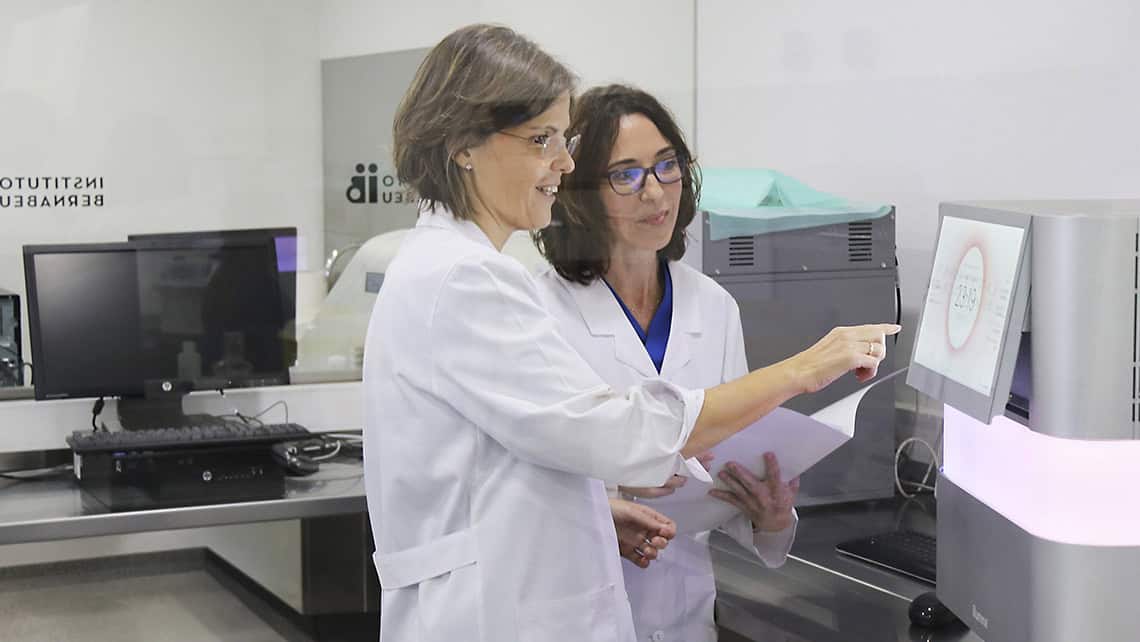Instituto Bernabeu incorporates the most advanced genetic analysis technique to identify embryonic abnormalities
December, 3rd 2024

- The PGT-A Advanced test allows to know the specific origin of possible alterations in embryos and increase the chances of successful pregnancies.
- The ability to select embryos with a lower risk of genetic abnormalities significantly increases the chances of a successful pregnancy and a healthy birth, as well as whether the abnormality originates from the father or the mother.
- Currently 1 in 3 embryos is screened with this technique.
In a further step towards excellence and innovation in assisted reproduction, Instituto Bernabeu has incorporated a significant improvement in the Preimplantation Genetic Test for Aneuploidy, called PGT-A Advanced. This innovation not only maintains the ability to identify chromosomal abnormalities in embryos, but also allows us to know the specific origin of these alterations in order to select the embryos that have a higher probability of generating a successful pregnancy.
Until now, with traditional PGT-A it has been possible to know the number of chromosomes in an embryo’s DNA to ensure they were present in the correct quantity, ruling out obvious genetic alterations. With PGT-A Advanced, the technique has evolved to provide crucial additional information to minimise the parents’ emotional cost.
Dr Belén Lledó, scientific director of the molecular genetics laboratory at Instituto Bernabeu Biotech, explains that this advance allows ‘not only to identify whether the chromosomal alteration originated in the father or the mother, but also opens the door to detecting triploidies’, a condition characterised by the presence of three sets of the same chromosome. Such triploidies could lead to miscarriages or negative pregnancy tests and could not be diagnosed with the previous conventional PGT-A. In addition, the parentage of the embryo has been identified, providing an unprecedented level of genetic information.
‘This advance in the technique not only expands our knowledge about the chromosomal health of the embryo, but also increases the accuracy in the diagnosis of embryonic mosaicism,’ highlights Dr Lledó. Embryonic mosaicism implies the presence of different cell lines in an embryo, and its accurate identification is essential for informed decision-making during the assisted reproduction process.
Preimplantation genetic testing has become a key tool for couples seeking to conceive, especially those who have experienced reproductive difficulties, have undergone recurrent miscarriages or have advanced maternal age, informs the molecular genetics laboratory at Instituto Bernabeu Biotech. The ability to select embryos with a lower risk of genetic abnormalities significantly increases the chances of a successful pregnancy and a healthy birth.
An increasingly necessary test in reproductive medicine
In 2024, PGT-A diagnosis was applied in 34.2% of the oocyte cycles performed at Instituto Bernabeu, which means an increase in the application of this technique of 48% in the last three years.
The main reason for the application of this breakthrough is that chromosomal alterations in embryos is one of the main causes of low pregnancy rates. Only embryos with an exact number of chromosomes allow the birth of a healthy baby. This technique is carried out in cases of advanced maternal age, women who have suffered repeated miscarriages or couples in which a severe male factor has been identified as the cause of infertility, among other cases.
With PGT-A Advanced, Instituto Bernabeu reaffirms its commitment to the forefront of assisted reproductive technologies, offering its patients a new dimension in decision-making based on accurate and detailed genetic information. This advance not only represents a significant improvement in therapeutic guidance to patients, as it allows shortening times to achieve a successful pregnancy, but also paves the way towards a deeper understanding of embryo’s genetics, one of the three main patients involved in any reproductive medicine process, together with the woman and the man.o de los tres pacientes fundamentales involucrados en cualquier proceso de medicina reproductiva junto a la mujer y el hombre.
